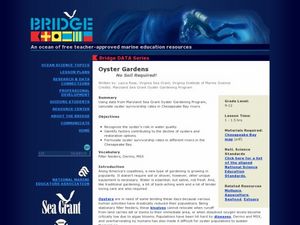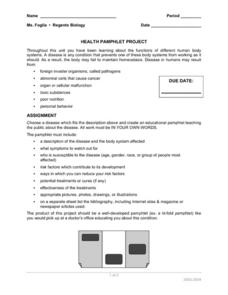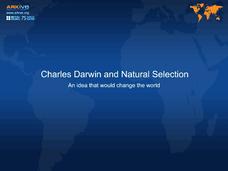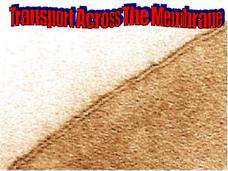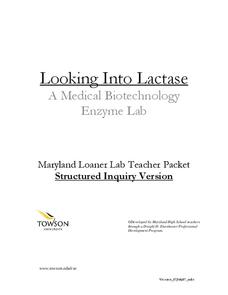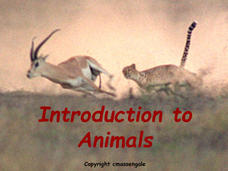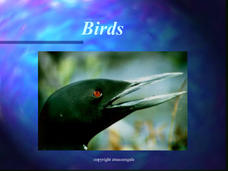Curated OER
Oyster Gardens - No Soil Required!
Explore the practice of oyster gardening. Because oysters play a vital role in marine ecosystems and their populations have declined, biologists are transplanting oyster seed to repopulate reefs. After learning about this practice,...
Curated OER
Protists and Fungi
Here is an outstanding presentation on protista. It lists general characteristics, and then moves on to describing three different categories of protists. For each, viewers learn physical features, behaviors, and means of reproduction....
National Geographic
Genetic Markers: Connecting the Dots
Biology buffs simulate how genetic markers are passed among populations in order to understand how these markers can help anthropologists map human migration. A couple of volunteers leave the room while you walk the remaining learners...
California State Parks
Energy Flow Through an Ecosystem
One of the key concepts in life science and biology is the cycling of energy throughout an ecosystem. Learners can take notes on the topic using the vocabulary included within the presentation. From producers making their own food...
Wordpress
Darwin’s Natural Selection Case Studies
This editable worksheet is set up so that biology pupils read four case studies and identify points that are present in each, such as overproduction, heritable variation, struggle to survive, and differential reproduction. They also...
Explore Biology
Health Pamphlet Project
Biology or health nuts select a disease to research and produce a pamphlet that can be used to inform the public. The tri-fold product is worth 100 points according to the included grading page.
ARKive
Darwin and Natural Selection
A presentation on Darwin's theory of evolution and natural selection could be a good addition to your biology class. It provides general information about how animals adapt to their surroundings, as well as how organisms create more...
ARKive
Adaptations for Movement
What animals are best suited for moving around a rainforest, or a desert? Design your own animal species based on a particular habitat, focusing on the characteristics it will need for optimal movement. Great as a group lesson or...
Gallantsbiocorner.com
Heart and Circulation
Young scientists get to the heart of the matter with this comprehensive review of the circulatory system. Addressing the different anatomical structures and processes involved in pumping blood through the human body, this worksheet...
Gallantsbiocorner.com
Transport Across the Membrane
Take your biology class on an exploration of the inner workings of cells with this multimedia presentation. Looking closely at the structure of cell membranes and the processes of osmosis and diffusion, this resource explains for...
BW Walch
Creating and Graphing Exponential Equations
Frequently found in biology and economic application problems, exponential equations show up as stars in this introductory presentation. Taking no background or knowledge of exponentials for granted, the slides walk learners...
University of Hawaiʻi
Taxonomy and Me!
Taxonomy is the study of organisms and how you phylum. Three biology activities are included, helping scholars understand four of the six kingdoms, specifically Protista, Plantae, Fungi, and Animalia. Scholars observe and classify...
University of Florida
Investigating the Fungus among Us
What do you call a fungus that writes music? A decomposer! Here, young biologists explore fungus by tasting fungus (blue cheese) to creating art with fungus to playing a board game centered around, you got it, fungus. Surprise...
Virginia Department of Education
Classification of Organisms
Searching for the perfect indoor/outdoor activity that allows class members the opportunity to learn about organism classification? Here, pupils research organisms and categorize them according to domain and kingdom over the course...
Teach Engineering
Computer Simulation of the Sonoran Desert Community
See how changes in initial populations and parameters affect a biological community. Individuals use a special software program to simulate a desert community with five species. They adjust initial populations to see how the community...
Towson University
Case of the Crown Jewels
Can your biology class crack the Case of the Crown Jewels? Junior forensics experts try their hands at DNA restriction analysis in an exciting lab activity. The lesson introduces the concept of restriction analysis, teaches pipetting and...
Towson University
Looking Into Lactase: Structured Inquiry
Why is lactase important? Biology scholars explore enzyme function in a structured inquiry lab. The activity tasks lab groups with observing how temperature and pH affect enzyme activity, as well as determining which milk products...
Discovery Education
The Science of Addiction: The Story of Teens
Users of Discovery Education's interactive on the biology of addiction examine common misconceptions about opioids and learn about the factors that cause addiction. Additionally, they listen to the stories of three teens and their...
Biology Junction
Annelids: The Segmented Worms
Here's a lesson that just might make your class squirm! Learn about segmented worms in a detailed PowerPoint presentation including the wriggly earthworms young scientists dig up in their backyards. Although seemingly simple creatures,...
Biology Junction
Biochemistry of Cells
Chemistry and biology work hand in hand, without one you literally wouldn't have the other. Using a presentation, individuals learn about plant cells, animal cells, cell responses, macromolecules, DNA bases, and so much more. A worksheet...
Biology Junction
Viruses, Viroids, and Prions
Are viruses living or non-living? According to the presentation, they are both and neither. Clearly, this requires clarification and an in-depth look at viruses, viroids, and prions. Young scientists learn about the history, structure,...
Biology Junction
Introduction to Animals
Out of all animals, elephants alone lack the ability to jump. Scholars learn all about animals using a presentation full of fun examples. It describes different types of animals, the biological similarities and differences between...
Biology Junction
Birds
Birds adapted to almost every climate on the planet, from the Arctic to the rain forests. A presentation focused on birds covers their similarities and differences. It starts with their evolution from reptiles, their many physical...
EngageNY
Presentation of Events: Comparing Two Authors
Give a little clue! Readers learn how context clues can help them determine the meaning of words by viewing a Context Clues Resource sheet then completing a Context Clues
practice sheet. They then compare events presented by two...
